- Home
- Rudy Rucker
Seek!: Selected Nonfiction Page 4
Seek!: Selected Nonfiction Read online
Page 4
Q22: Can the "noise" be discussed from the standpoint of the information ideology? What is the position of "noise" in the information ideology?
A22: In the theory of communication, noise is a corruption of a signal you want to send. Noise is like static and clicks in telephone conversation. Shannon's Theorem says that you can overcome noise by repeating yourself a lot.
In practice we expect people to not receive everything we say correctly, but it is too boring to repeat oneself word for word. Instead you tend to say the same thing again, but in a different way. And perhaps there is some certain kind of noise that makes one way of expressing yourself incomprehensible, but if you express yourself in a new way, then the new way finds a clear gap in the noise spectrum.
Page 22
In chaos theory, we distinguish orderly, periodic processes from processes which appear random and noisy. The interesting thing is that certain kinds of deterministic equations can generate time sequences which superficially seem random even though they have a definite rule. The best kinds of chaotic processes will seem to spontaneously fluctuate between orderly and disorderly modes. The disorder appears when the process moves to a different region of its chaotic attractor, and then when the process settles onto a certain region of the attractor for awhile it seems somewhat orderly again.
In understanding what I am saying about a chaotic process, you might think of the branch of a tree blowing in the wind, or of a piece of paper that you are waving with your hand. Sometimes the branch or paper will flutter regularly, but then it can slip into a different mode of oscillation (into a different part of its strange attractor) and oscillate in an unsteady fashion.
In terms of noise and communication, I find it interesting that these words of mine are going to be translated into Japanese, and I will never in fact know what kind of understanding they are going to communicate to my esteemed Japanese readers. Something of my voice and message is preserved, but I have no way of knowing what this Japanese voice of mine sounds like. I hope it sounds like the Japanese voice my translators give me for my SF novels. Really I always say more or less the same thing.
Q23. People tend to find noises in artificial and technological objects, not in natural creatures. How do you see the relations between noises and artifacts?
A23: I would say that nature is also full of noises, such as the sound of rustling leaves or falling rain or chirping birds. Nature is essentially chaotic - it has underlying rules, but the working out of these rules produces patterns that are simply not predictable by a human brain.
The really objectionable noises are indeed from technological objects. As I write this answer, for instance, my neighbor's gardener is using a gasoline-powered leaf-blower to move small bits of dead leaves around this neighbor's yard. I find this noise annoying. What is annoying about the sound of an engine is that the sound is not interestingly chaotic. The sound is just the same power spectrum
Page 23
over and over and over. Even if I change my focus of attention or think about things in a different way, the engine keeps going, and eventually it wins back my attention.
The bad kinds of noises are the ones that are not chaotic enough, but are instead very repetitive. These are the kinds of bad noises that machines are likely to make.
Q24: Generally, noises are considered something useless. What are positive elements of noises we should pay more attention?
A24: It is an interesting exercise when you are walking around to try and become fully aware of the sounds around you. If you ever happen to make a tape recording outside, you will be surprised at how many noises there are besides the sound of the voices you are perhaps trying to capture. Becoming aware of the full tapestry of noise around you is a good method to heighten your consciousness and make yourself feel more tightly woven into the undivided fabric of the One World. To get started with this awareness, it may help to close your eyes.
Q25: As seen in samplings in music and uses of ready-made products in artwork, contemporary arts are seemingly moving toward ''application," apart from the traditional idea of "creation." What does this tendency reflect in terms of changes in people's consciousness and thoughts?
A25: If you play a tune on the piano you are already in some sense sewing together samples of notes. But instead of pasting in a sound file for the note C, for instance, you are generating the sound file for the note C by pressing the piano key. On the other hand, a good pianist really is doing more than assembling a series of notes. There are in fact many different ways to play the note C and many different ways to segue it from the note before to the note after. The thing is, a piano is extremely responsive to very subtle muscular cues that a person can generate. If you are just pasting in a sound file for the note C, there are only going to be a limited menu of selections about what type of C note you want. The richness of human analog muscle expression goes far beyond any digitized program we yet have.
I think it will continue to be true for a very long time that the subtleties of sounds or colors or phrasings are going to allow a much wider palette of possibilities than will any cut-and-paste computer collaging process. So I would say the process of "creation" rather
Page 24
than "assemblage" will continue to be the most essential form of artistic expression.
On the other hand, in connection with the notion of noise, it is certainly true that a modern composer has the possibility to paste in a lot of interesting sound structures.
But just pasting things together isn't enough. It may superficially look like a complex work of art, but when you explore it more closely, it doesn't hold up unless the artist has a really close involvement in the work at many levels.
San Francisco, California
From: John Shirley
For: Introduction to HardWired edition of White Light
Q26: Is there, in brief, a general overall Rucker Theory of the Motif of the Transreal Books? A linking esthetic?
A26: Oh yes! It's called "A Transrealist Manifesto," and it appears in my new nonfiction anthology Seek! But let me try and summarize it for you.
Transrealism means writing about your immediate perceptions in a fantastic way. The characters in a transreal book should be based on actual people. This has the effect of making the characters be richer and more interesting. One inspiration for me in doing this is Jack Kerouac, who thought of his novels as a single linked chronicle. Though many would just call Kerouac's books autobiographical novels.
My transreal novels aren't exactly autobiographical: I have never really left my body, climbed an infinite mountain, met a sphere from the fourth dimension, infected television with an intelligent virus, etc. But they are autobiographical in that many of the characters are modeled on family and friends - the main person of course being modeled on me. The science fictional ideas in my transreal fiction have a special role. They stand in for essential psychic events.
The quest for infinity, for instance, is nothing other than the soul's quest for God. Or, more mundanely, it represents the individual's quest for meaning. In another sense, a White Light at the top of a transfinite mountain stands for the psychedelic experience, which loomed large in those years when White Light was written
Page 25
(19781979). But, again, the whole point of the psychedelic experience, at least from my standpoint, was to see God. Another inspiration for me in pursuing transrealism is Philip K. Dick. His blackly hilarious book A Scanner Darkly was a real inspiration for me in forming my ideas about this way of writing. And in fact Scanner had a blurb on it describing the book as "transcendental biography," which was probably the reason I coined the word "transreal."
In a nutshell, transrealism means writing about reality in an honest and objective way, while using the tools of science fiction to stand for deep psychic constructs.
St. Paul, Minnesota
From: Patrick Clark
For: Interference On the Brain Screen
Q27: We were talking about your p
ublic image, and I think you mentioned you had something to say about drugs and alcohol?
A27: It's kind of touching how much attitude I used to have. I was pretty desperate to get noticed. To be different.
For a long time I embraced the classic notion that drinking and taking drugs is a bohemian identifier, a legitimate path to enlightenment. As I got to be older than Poe and Kerouac ever were, it became all too evident to me that their "left-hand" path is not a sustainable one. "It just ends in tears," as my mother used to say vis-à-vis almost anything.
I've been clean and sober for almost three years now, which feels like a big and joyful deal to me. I couldn't have done it without group support. The simple act of reaching beyond yourself and asking for help seems to be crucial.
I used to be scared that if I got straight I wouldn't be the same person, that the wild creative part of me would go away. Well, I'm not exactly the same person - but I still feel creative. My bizarre and millennial Saucer Wisdom will be out in mid-1999. And I recently finished Realware, which is the coda and finale of the Ware tetralogy. There is, I would say, as much weirdness in these books as ever.
Regarding enlightenment, it seems humorous to me that I used to think enlightenment was about getting wasted and blasting my
Page 26
brain into nullity. The flash, the pop, the white light. Like it never occurred to me that attaining enlightenment might have something to do with becoming a better person or being more loving to those around me. I've finally started getting some serenity now and then.
"Let go, let God." Brain-dead bumper sticker or profound truth? Yes, yes, it's the latter, even if you write in Olde English Scripte. There's some good raps about the bumper sticker/profound truth dichotomy in David Foster Wallace's book Infinite Jest. I read that book in early 1996, right before I finally got sober, and it made a real difference to me.
Some people say that Infinite Jest is too fat to read, but you have to know how to deal with a book that size, you can't let it boss you around, you have to just dive in there and carve out what you can use. In my case, I tossed out all the parts about prep school tennis matches and read the stuff about recovery and halfway houses, which is still enough for a really big book. The footnotes were good too. And the wheelchair assassins. Wallace is a great man.
Q28: In closing, what book would you like to be published Ace double "69 style" with?
A28: I already did it! The small press Ocean View put out my transreal rant-memoir All the Visions back to back with a book of poems Space Baltic, specially selected for the occasion by my favorite poet Anselm Hollo. Check it out, you can actually still order it from Ocean View, like through www.amazon.com, it's beatnik heaven, with a cover by Robert Williams yet.
London, England
From: Matthias Penzel
For: Frankfurter Rundschau
Q29: Unlike with rock'n'roll interviews, the preparation for writers' interviews is immense (weak excuse, mediocre explanation). Unfortunately I have not managed to read all your books before this interview. Which one (talking about your fiction) would you single out as your masterpiece?
A29: That's like asking a father which child he likes best. I love them all in different ways. I do feel that as time goes by I get more
Page 27
mastery of my writing, so in that sense I usually think my most recent book is the best. Today that would be Realware. As a practical matter, it is in any case better for me to believe that my latest book is my best. I would not want to think that a book I wrote a long time ago is better than a book I can write now. I feel like I am still on the upward part of my trajectory.
Q30: Although having been translated into German by Udo Breger who could probably be regarded as one of the country's leading translators, your books never quite cracked the German market - s that because they will always only appeal to a smallish cult audience anyway, or is it the matter of language?
A30: Maybe as the years go by, the mass of people will like my books more than they do now. It could be a matter of my being ahead of my time. Or it could be that my books are a little too esoteric for a true mass popularity. I write intellectual, high-literature, counter-cultural science fiction.
It could also be that my style of humor appeals more to Americans than to Germans. But at least one other country likes me: my books seem to be quite popular in Japan, perhaps even more so than in the U.S. I think all my novels are in print in Japan, which still remains an impossible dream for me in the U.S. But I still think my day will come. The trick is to try and have it happen before you die.
I'm sure that Udo Breger did a great job in translating my books into German, he was very meticulous and sent me lists of words he wasn't sure about how to translate, which is something very few translators think of doing. I wish they all would.
In any case, it's not in my interest to take the number of copies sold as my supreme yardstick of success. I'm happy that I'm published at all, and that my books do indeed speak deeply to some individual readers.
Q31: What do you think is your most important activity?
A31: At the personal level, the most important thing I ever did was to father and help raise our three children. At the public level, my most important activity is writing, although maybe in the long run it's my sensibility that will have the most lasting influence: my combination of humor, anarchy and scientific engagement.
Q32: Do you listen to your rock'n'roll on vinyl or CD?.
Page 28
A32: CD. I have a large collection of my old vinyl records, most in bad shape from much party use. The sound system I happen to have these days isn't compatible with a turntable so I can't play my vinyl records anymore. They're in boxes in the basement. My children want to inherit them.
Q33: Who do you rate the most important writers of this century?
A33: I'll certainly vote for myself! Otherwise, not to make too long a list, let' s say Kerouac, Pynchon, Borges, Burroughs, Kafka, Poe.
Pynchon is really the best of all. He is our James Joyce. The richest language, the deepest feeling. I was so sorry when I was done reading Mason & Dixon.
Borges has the best ideas, the fine language also, the dryness. Borges has a phrase that's of comfort to me (he's writing of Melville and Edgar Allan Poe), "Vast populations, towering cities, erroneous and clamorous publicity have conspired to make unknown great men one of America's traditions." Sometimes I like to imagine that's a description of me.
Kerouac and Burroughs are a special case. It's hard to point to many books by them that are really impeccably great. It's more a matter of great passages and of a great vibe, the beatnik vibe that had such an influence on me growing up. Speaking of beat sensibility, I always liked Charles Bukowski a lot as well.
I like to think of cyberpunk as a new kind of beat movement. The beats had Kerouac, Ginsberg, Burroughs, Corso. The cyberpunks had Gibson, Sterling, Rucker, Shirley. Burroughs was the oldest of the beats, and I'm the oldest cyberpunk.
Poe and Kafka are a bit like the beats in that their sensibility has perhaps a greater influence than their individual works. In both cases there are not any fully successful novel-length works, although there are any number of perfect gem-like passages and stories.
Erasmus, Belgium
From: Koen Hendrickx
For: Planet Internet (ISP) based in Antwerp
Q34: There seems to be a central theme in your science fiction: Artificial life forms resemble biological life forms because they both
Page 29
reproduce themselves and they both evolve according to the laws of the survival of the fittest?
A34: Yes, this idea was implanted in me by the mathematician Kurt Gödel, who remarked that although it is absolutely impossible to design a machine as intelligent as oneself, it is possible to bring about a situation where such a machine can evolve. Of course at this stage in history, we are still nowhere near the limits of the intelligence of the machines that we actually can design. But in some far fut
ure, it will be necessary to use artificial evolution to go beyond what we can design. I might remark that I was a little over-optimistic in setting Software in the year 2020, which is now just around the corner.

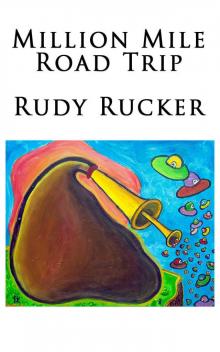 Million Mile Road Trip
Million Mile Road Trip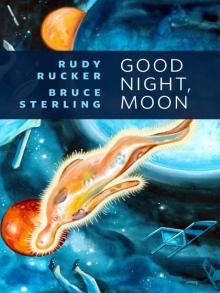 Good Night, Moon
Good Night, Moon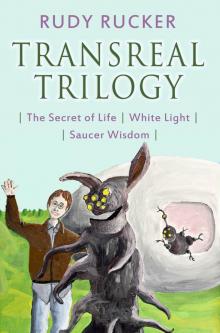 Transreal Trilogy: Secret of Life, White Light, Saucer Wisdom
Transreal Trilogy: Secret of Life, White Light, Saucer Wisdom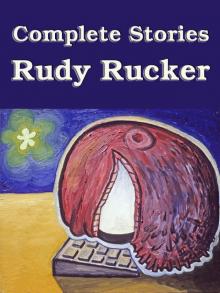 Complete Stories
Complete Stories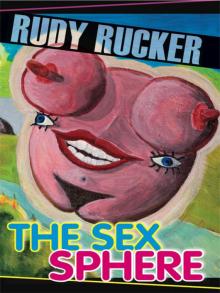 The Sex Sphere
The Sex Sphere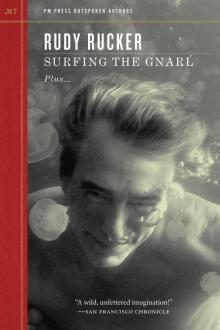 Surfing the Gnarl
Surfing the Gnarl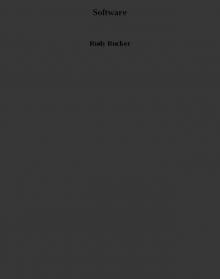 Software
Software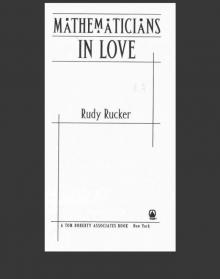 Mathematicians in Love
Mathematicians in Love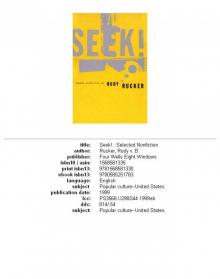 Seek!: Selected Nonfiction
Seek!: Selected Nonfiction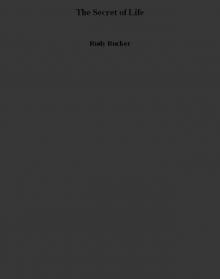 The Secret of Life
The Secret of Life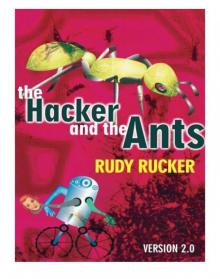 The Hacker and the Ants
The Hacker and the Ants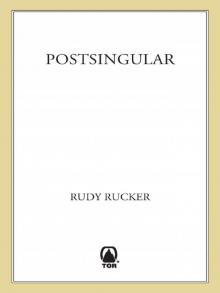 Postsingular
Postsingular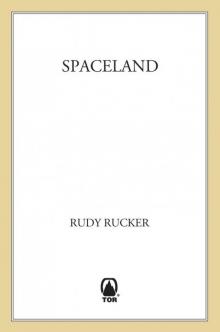 Spaceland
Spaceland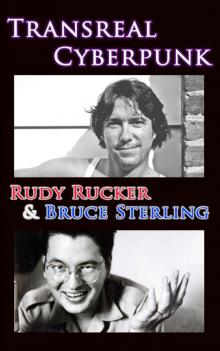 Transreal Cyberpunk
Transreal Cyberpunk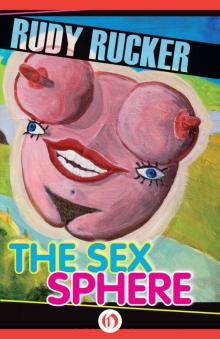 Sex Sphere
Sex Sphere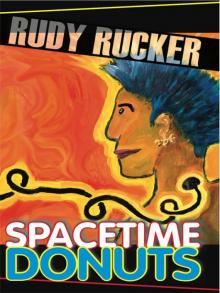 Spacetime Donuts
Spacetime Donuts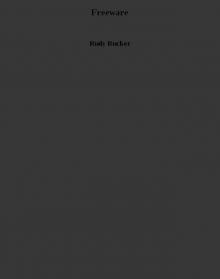 Freeware
Freeware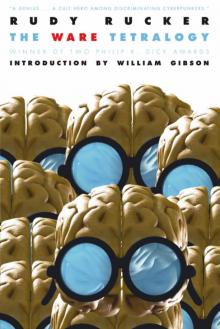 The Ware Tetralogy
The Ware Tetralogy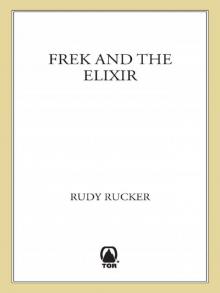 Frek and the Elixir
Frek and the Elixir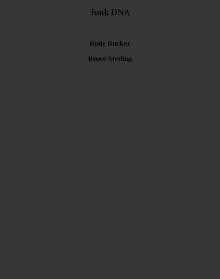 Junk DNA
Junk DNA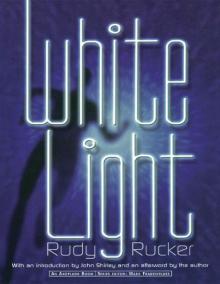 White Light (Axoplasm Books)
White Light (Axoplasm Books)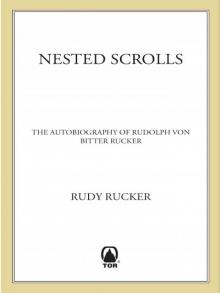 Nested Scrolls
Nested Scrolls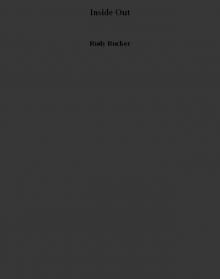 Inside Out
Inside Out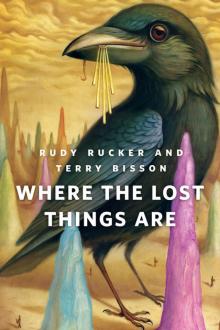 Where the Lost Things Are
Where the Lost Things Are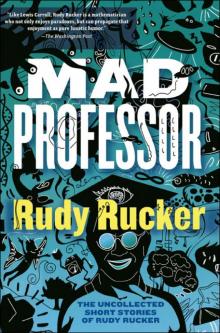 Mad Professor
Mad Professor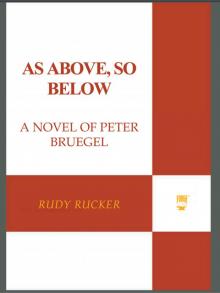 As Above, So Below
As Above, So Below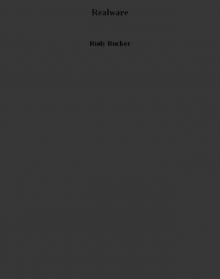 Realware
Realware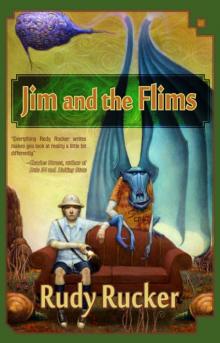 Jim and the Flims
Jim and the Flims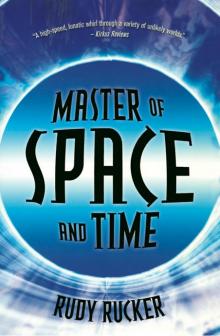 Master of Space and Time
Master of Space and Time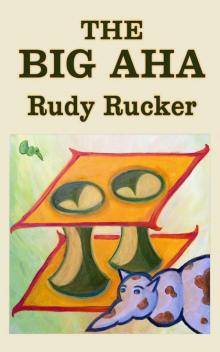 The Big Aha
The Big Aha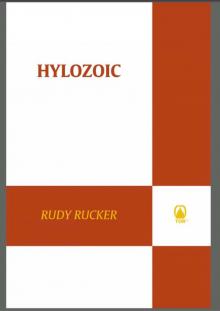 Hylozoic
Hylozoic